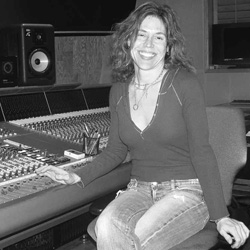
Do you take the same approach if you and the artist aren’t seeing eye to eye?
You know, it’s weird, but that’s never happened to me.
I always seem to find a way to figure out what the artist needs, and why they need it, and we always seem to find a way to resolve differences of opinion without it ever getting ugly.
Maybe the key is that I always try to meld the artist’s needs into something that the label wants, too. In other words, if an artist refuses to use a click track, okay, fine, they don’t have to.
But then they need to understand that I’m going to have to edit the shit out of the drums so the label will feel like the song is in the pocket.
Okay, you’ve just made hours of work for me, but I’ll do that so that the track will feel really steady and you can still say that you didn’t use a click.
The people who hire me really trust me, and they usually recognize my abilities as an editor, a crafter. I can look at a body of work and see what needs to be removed and what needs to amplified, what’s missing and what could use a slight arrangement shift to be more powerful for the listener.
So if I say, “Look, this is not working; it just doesn’t feel good,” they usually say, “Alright, let’s try it another way.”
I’ve never locked horns with an artist, and if it looked like things were going to go that way, I’d rather just give them back their money and leave. Out of the hundreds of projects I’ve done, I’ve only ever left a project twice in my life, and those were both mixes.
I left because I knew it wasn’t working and there was no way the artist and I could see eye to eye. Both times, I simply asked them to pay me for the hours I put in and, in exchange, I dissolved any other agreement we had.
Why do you think there are so few female producers or engineers in the industry?
Well, it’s a really, really, really hard thing to do for anybody, whether you’re a man or a woman.
Most people aren’t going to make any money at this for at least 10 years, and you aren’t going to be able to have any serious personal relationships, because you have to be committed to spending 14 hours a day in the studio for months at a time.
For a woman, you absolutely cannot try to start a family in your twenties, and possibly not for most of your thirties.
You have to accept that you’re going to be alone for 10 or 15 years, and you may miss out on ever being married or having children as a result of that.
Your male counterparts are not going to have to deal with that. If I had decided to have a baby when I was 28 or 29, that would have knocked me out of the business.
Not because the business would say, “No people with babies allowed,” but because, even assuming I would have been willing to spend so much time apart from my child, I wouldn’t have been able to afford quality childcare.
I don’t think there’s anything else holding women back, so maybe it just comes down to the fact that a lot of women decide to have a child, which precludes them from going after this career full force.
I really struggle now between being in the studio and being with my kid. I just don’t want to sit there for 14 hours a day—I want to go see my little boy.
What happens is that all the mommy wiring comes out and you find yourself thinking, “You know what? I’m not interested in your guitar part—I’m interested in my baby, and I want to go see him, so hurry up!” [laughs]
There are women astronauts who will tell the same story: it’s really rough to have a highly competitive, highly desirable professional career and be a mom. The women who don’t have babies are doing fine—they’re out there making records and they’re having a good time.
